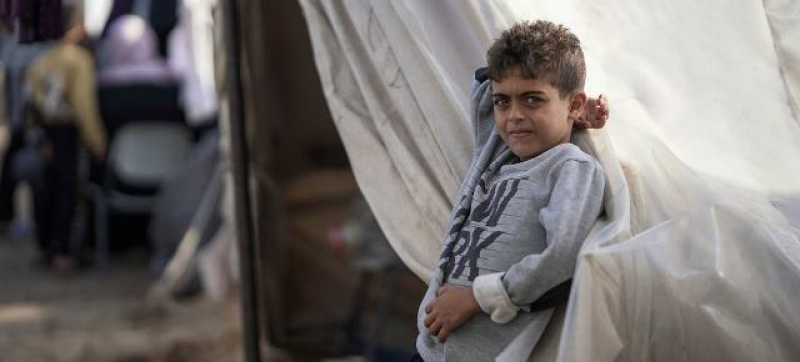- High-level meeting reviews country’s economic progress |
- Dhaka suspends visa, consular services at its Delhi, Agartala Missions |
- Govt to cut savings certificate profit rates from January |
- Gold prices hit fresh record in Bangladesh within 24 hours |
- Election to be held on time, Prof Yunus tells US Special Envoy |
Gaza humanitarian disaster heralds 'breakdown' of society

Thousands of families are sheltering in camps in southern Gaza. © WHO
8 December 2023 - As intense Israeli bombardment of Gaza and fighting with Palestinian armed groups continued to impede aid operations, reports on the ground of children begging for water and people cutting down telephone poles for firewood indicated that “society is about to break down”, UN humanitarians said on Friday.
In a letter to the President of the UN General Assembly Dennis Francis, the head of the UN agency for Palestine refugees (UNRWA), Philippe Lazzarini, warned that UNRWA's ability to implement its mandate in Gaza is “severely limited” and that the primary platform for humanitarian assistance to over 2.2 million people in Gaza is “on the verge of collapse”.
“Our staff are still operating health centres, managing shelters, and supporting traumatized people, some arriving carrying their dead children,” he said, but most of them are themselves displaced and lacking food, water and shelter.
So far 130 UNRWA staff have been killed in Gaza since the beginning of the escalation.
“In my 35 years working in complex emergencies, I have never written such a letter - predicting the killing of my staff and the collapse of the mandate I am expected to fulfil,” Mr. Lazzarini wrote. He urged the General Assembly to implement an immediate humanitarian ceasefire, enable the protection of civilians and UN staff and infrastructure and “protect prospects for a political solution that is vital to peace, security and rights for Palestinians, Israelis and the region”.
'Beyond belief'
The people of Gaza are being “forced into a horrible scenario” amid a “cruel campaign” by Israel against the population of the Strip in retaliation for Hamas’ terror attacks on 7 October, UN health agency WHO spokesperson Christian Lindmeier told journalists in Geneva on Friday.
“The situation in Gaza is beyond belief” he stressed, insisting that the enclave “cannot afford to lose” one more ambulance or hospital. WHO has documented 212 attacks on healthcare in the Strip since 7 October affecting 56 facilities and 59 ambulances.
Meanwhile in New York, an emergency meeting of the UN Security Council to discuss the Palestine-Israel crisis is set to take place on Friday morning local time.
Trauma wards like ‘battlefields’
The health workers in Gaza don’t have food or water, patients are bleeding on hospital floors and trauma wards resemble battlefields, Mr. Lindmeier said.
Usually “in any refugee camp situation” there would be a minimum of seven litres of water per day per person, he stressed, while in Gaza that number is currently between one and two litres. WHO convoys have repeatedly been stopped on the road while trying to bring medical supplies, with desperate people “trying to force food and water out of them”.
The WHO spokesperson also revealed that on Friday a convoy of medical supplies destined for Al-Ahli hospital in the north, which was also aiming to evacuate 12 patients to the south, had to be suspended due to the security situation.
Mr. Lindmeier added that a special session of the WHO Executive Board would take place on Sunday to discuss health conditions in the occupied Palestinian territory, following a request from 15 of its 34 members. A draft decision which will be discussed at the meeting, he said.
‘So much more is needed’
In a more positive development, on Thursday WHO delivered trauma and emergency care supplies to the European Gaza Hospital and Nasser Medical Complex in Khan Younis in the south, to cover the needs of 4,500 patients. This was the first such delivery mission since 29 November.
The agency’s chief Tedros Adhanom Ghebreyesus wrote on social platform X that “so much more is needed” and deplored the fact that the intense fighting was making it “increasingly difficult to run any health operations”.
He added that WHO is “extremely concerned” about thousands of patients and health workers in the Strip.
“The only way to protect them is a ceasefire. Now,” he wrote.
Humanitarian operations impeded
Humanitarians continued carrying limited aid distributions in the south of the Strip while continuing to stress on Friday that “nowhere is safe”.
On Thursday, such limited aid distributions took place in Rafah governorate, UN humanitarian affairs coordination office OCHA said.
OCHA notes that in the adjacent Khan Younis governorate, except for the above-mentioned medical supplies delivery, “aid distribution largely stopped due to the intensity of hostilities”.
The UN Office also stressed that as tens of thousands of additional displaced people are being pushed further south and squeezed into compressed spaces, their survival is “hanging by a thread”. OCHA head and UN emergency relief chief Martin Griffiths warned on Thursday that due to the pace of the Israeli military assault in the south of the enclave “we do not have a humanitarian operation in southern Gaza that can be called by that name anymore”.
‘Breakdown in law and order’
OCHA reported that the influx of internally displaced persons to Rafah has continued and that there was “no empty space left for people to shelter, not even in the streets and other open areas”.
Thousands of people lacking basic essentials waited for hours around aid distribution centres and “there are concerns of a breakdown in law and order under these conditions,” OCHA said. – UN News

